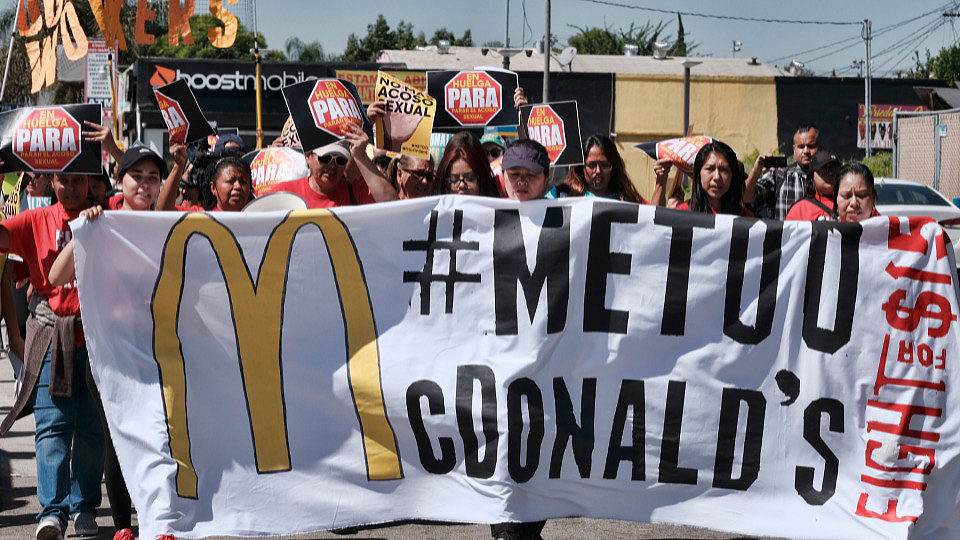
LOS ANGELES—“Striketober” may be over, but forced worker walkouts continue, with a big one coming on Nov. 9 by fast-food workers in California.
And a mandatory 10-day strike plan announcement by unions representing 32,000 Kaiser workers nationwide will be issued the same day. Another 8,000 may join them the week after; 12,000 more are affected.
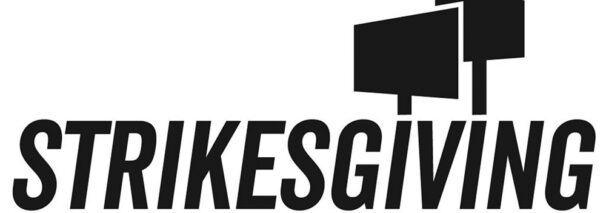 The AFL-CIO has christened this next phase of labor uprisings “Strikesgiving,” with Thanksgiving on the horizon and fall carrying into the holiday season.
The AFL-CIO has christened this next phase of labor uprisings “Strikesgiving,” with Thanksgiving on the horizon and fall carrying into the holiday season.
The first big walk out of the month by McDonald’s workers in Los Angeles, San Jose, Oakland, Sacramento, and San Diego is over health and safety conditions and especially the burger chain’s refusal to deal with sexual harassment on the job.
The latest horrifying case was in a McDonald’s restaurant in Pittsburgh. Male manager Walter Garner, 42—a registered sex offender whom the firm did not check out—raped a 14-year-old girl worker in a bathroom in February, after harassing two others in prior months. One of her friends told school officials, who called police, the Pittsburgh Post-Gazette reported.
Garner was arrested and jailed in May, charged in late September with rape and eight other felonies.
The Californians also demand the state legislature pass AB257 to govern the exploitative industry. It would mandate a joint labor-management-public commission to monitor conditions there, plus sectoral bargaining, where workers and their unions would face bosses of all fast food chains across the table.
And AB257 would hold both the corporate headquarters and individual franchise-holders jointly responsible for bargaining with workers—and obeying, or breaking, labor law. They don’t now.
“Cashier Yamile Osoy, 26, developed such severe COVID-19 symptoms that she told her shift manager she felt sick and wanted to go home. According to her complaint, he ordered her to lower her mask so she could breathe easier—and finish her shift,” Service Employees Local 1021 reported after a prior one-day forced walkout.
The 10-day notice by the Kaiser workers, who will be forced to walk on Nov. 15, is about straight corporate greed. And the AFL-CIO and major unions are lining up in solidarity with them.
There, a multibillion-dollar hospital chain demands—in stalled bargaining—a two-tiered pay scale that would reduce starting wages for new hires by 15% below current levels. Kaiser also offers current workers a skimpy 2% pay raise, double its last proposal to its nurses, aides, orderlies, and other essential workers who have toiled through the coronavirus pandemic.
McDonald’s first, and it isn’t the first time workers there have raised the issue of sexual harassment on the job.
“When I became the target of sexual harassment and discrimination because of my disability, I knew I had to speak up, and being a part of the Fight for $15 and a Union helped me find my voice,” 28-year-old McDonald’s worker Emmanuel Flores of Los Angeles wrote in an op-ed for Newsweek on March 10, 2020—just three days before the nationwide coronavirus pandemic shut down fast-food restaurants and other businesses.
Flores described sexual jokes, sexually explicit photos, and harassment. He wound up leading a one-day walkout at his McDonald’s in L.A., 18 months ago, according to meTooMcDonalds.org.
This time, with the support from union-backed Fight For $15 And A Union and the ACLU, the fast food workers took to the streets to protest the firm’s refusal to deal with the issue.
Speaking to the Los Angeles Times, workers told not just of sexual harassment on the job, but of retaliation when they spoke up, at McDonald’s and elsewhere. Some, despite that, have stepped forward to California officials and the National Labor Relations Board with formal complaints.
But the McDonald’s walkouts also spotlight a national issue: Who’s responsible, on the bosses’ side, for dealing with workers—and their exploitation—when the parent firm owns franchises coast to coast?
Such “joint employers” have been increasing and they’re an increasing tangle for workers. Firms, and not just in fast food, subcontract out work, including through franchises. Think building owners hiring outside exploitative janitorial firms.
Then, when the subcontractor, in this case McDonald’s local franchise-holders, exploits workers through wage theft or through doing minimal anti-harassment training, it pleads it’s following corporate policy and tells the workers to battle corporate headquarters. Corporate retorts labor relations are the province of the local franchise-holder.
That leaves the workers as ping-pong balls between the two, with nowhere to turn, and it also forces them, especially at McDonald’s, to strike to get the company’s and the public’s attention. The NLRB’s new General Counsel, former top union attorney Jennifer Abruzzo, wants to go back to holding both the local boss and the corporate honchos liable for employer misconduct.
But in the meantime, the McDonald’s workers were forced to strike for a day.
The Kaiser mess has been simmering longer. Bargaining has gone virtually nowhere for seven months. The workers drew support in a joint statement by AFL-CIO President Liz Shuler and the presidents of the Teamsters, the Teachers, AFSCME, the Operating Engineers, the United Food and Commercial Workers, Unite Here, and the Steelworkers.
“The entire labor movement is behind the Kaiser Permanente employees standing up to corporate greed at its worst,” they said. “We will put all our efforts into supporting the nearly 32,000 health care workers who are ready to strike on Nov. 15, 2021, unless negotiations improve. An additional 8,000 workers could strike the week after. In all, a total of 52,000 nurses and professional, service, and technical workers” are represented by the unions whose leaders signed the statement.
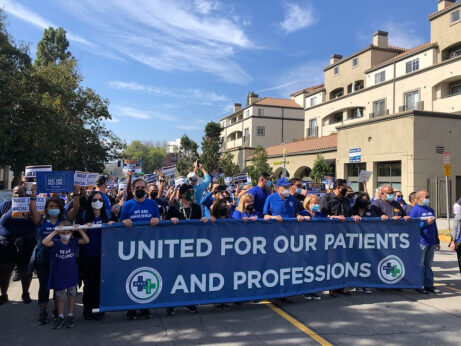
That impact would occur at hospitals and clinics in Georgia, Maryland, Virginia, D.C., Colorado, California, Oregon, Washington, and Hawaii. Weeks ago, the workers at the three largest locals at Kaiser, covering 32,000 workers, gave their boards strike authorization by 95%-5% in combined voting.
“In light of historic labor shortages and half a million health care workers leaving the profession, and the sacrifices of the past 20 months, KP doubled down on a two-tier proposal to reduce wages for future hires—worsening the staffing crisis and harming patient care,” the Alliance of Health Care Unions said.
“KP ties a 2% lump-sum bonus for the third and fourth year” of its proposed contract “to a two-tier wage scale—attempting to twist the arm of health care heroes to sell out their future colleagues.” If current workers don’t agree to “no more than 10% over the market median” pay of other hospital chains, Kaiser “will unilaterally reduce the current wage rate by 15% for ALL jobs for future hires.
“It’s a ‘heads we win, tails you lose’ proposition,” the alliance said. Details are at www.ahcunions.org.
“We are starting our seventh month of national bargaining and KP execs have still not satisfactorily addressed our proposals on wage justice, staffing, student loan assistance, active medical insurance in several regions, first contracts, local bargaining, and other concerns,” the alliance adds.
That’s especially nasty given that Kaiser health care workers, like other health care workers nationwide, were deemed “essential” when the coronavirus pandemic hit, and forced to work—a point Shuler and the other union leaders made in their statement.
“These workers risked their lives in a desperate struggle to save patients in a global pandemic, lacking basic protective equipment, sleeping in their cars and hotels to protect their families, and suffering extreme physical and mental health challenges with which they are still coping,” the union leaders said.
“These health care heroes are now struggling harder than ever” battling the coronavirus, post-traumatic stress disorder and “a new tsunami of resignations and retirements that have left them so short staffed that some days their units feel as besieged by patient needs as they were in the darkest days of the surges.”



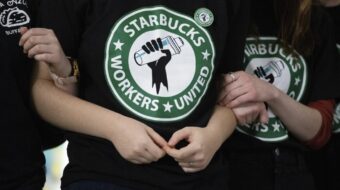

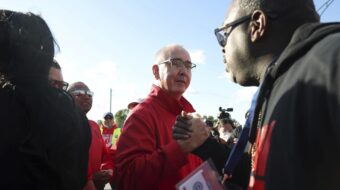






Comments